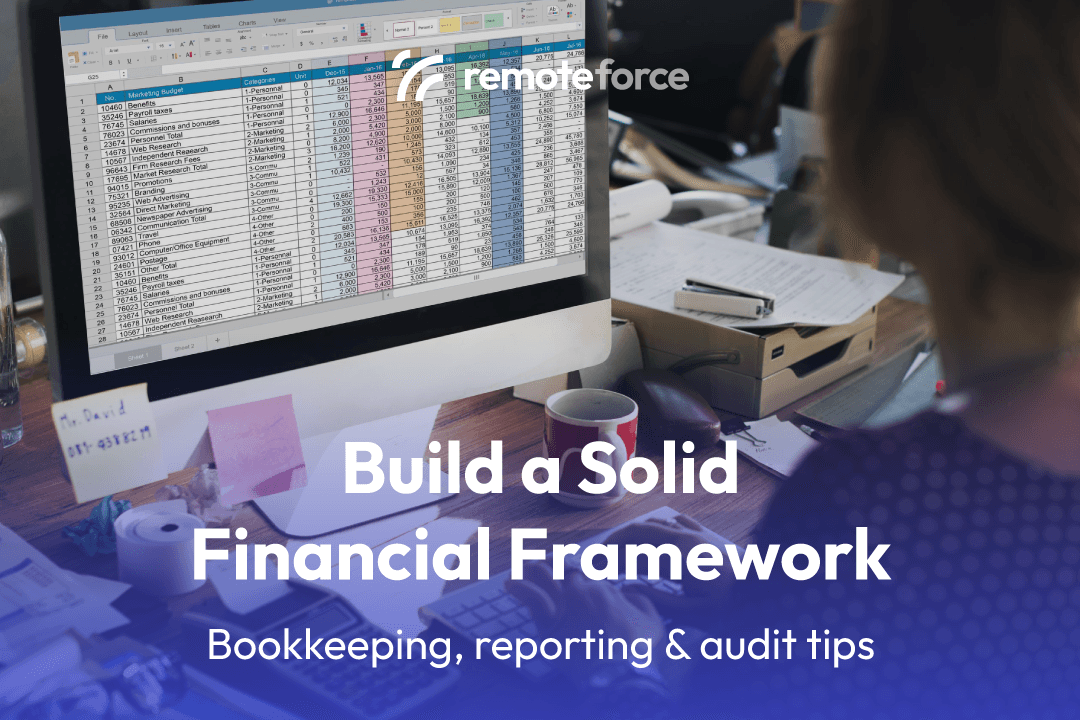In today’s fast-paced business environment, financial clarity is more than a regulatory requirement—it’s a strategic advantage. Clean, organized, and transparent financial records empower business leaders to make informed decisions, attract investors, and withstand regulatory scrutiny with confidence. But how do you build such a robust foundation?
It starts with mastering the building blocks of accounting and audit processes. From daily bookkeeping to complex financial evaluations, every detail matters. Below are the 8 essential components that can help you enhance your accounting systems and ensure your business stays on a path of stability and growth.
Table of Contents
Toggle8 Essentials to Strengthen Your Bookkeeping
1. Bookkeeping: The Daily Discipline That Builds Long-Term Clarity
Bookkeeping may sound basic, but it’s the backbone of any financial system. It involves the meticulous recording of every business transaction—sales, purchases, payments, receipts, and more. Without consistent and accurate bookkeeping, even the most sophisticated financial analysis can fall apart.
Good bookkeeping ensures:
All financial activity is traceable
No data is lost or misrepresented
Reports and audits are easier and faster to produce
By establishing reliable bookkeeping practices early on, businesses avoid costly mistakes and lay the groundwork for strong financial management.
2. Financial Reporting: Turning Numbers Into Strategy
While bookkeeping captures data, financial reporting turns that data into stories—ones that guide leadership decisions and investor confidence. These reports include balance sheets, profit and loss statements, cash flow statements, and statements of changes in equity.
Effective financial reporting:
Keeps internal and external stakeholders informed
Supports strategic planning and forecasting
Helps meet legal and tax obligations
Consistency, timeliness, and alignment with accounting standards (like IFRS, MFRS, or GAAP) are key to delivering meaningful and credible financial reports.
3. External Financial Statements Audit: A Mark of Trust
An external audit is more than just a tick-the-box compliance exercise. It involves an independent examination of your financial records by certified auditors who follow International Standards of Auditing (ISAs).
This process:
Verifies the fairness and completeness of financial statements
Detects inconsistencies or non-compliance with regulations
Enhances credibility with shareholders, partners, and regulators
In jurisdictions like Labuan, Malaysia—a known tax haven—external audits are particularly crucial for entities like foundations, trust bodies, and financial service providers, ensuring legitimacy and accountability.
4. Forensic Audit: Investigating the Unexpected
When suspicions arise—fraud, embezzlement, or mismanagement—forensic audits come into play. Unlike standard audits, forensic audits are investigative in nature and often serve as a prelude to legal action.
A forensic audit:
Digs deeper than standard reviews
Identifies red flags, manipulations, or unethical practices
Supports legal evidence in court if needed
For growing companies and financial institutions, having access to forensic auditing expertise can be critical in times of crisis.
Also Read: What Is Bookkeeping? A Simple Explanation
5. Agreed Upon Procedures (AUP): Focused Fact-Finding
An AUP engagement is tailored to verify specific transactions or financial elements. It doesn’t result in an audit opinion but delivers factual findings based on procedures agreed upon in advance by both the client and the auditor.
This approach is:
Cost-effective
Highly customizable
Ideal for investors or partners who need assurance on certain items
AUPs are common during mergers, acquisitions, or when regulatory bodies request clarification on specific financial issues.
6. Accounting Health Check: Your Financial System’s Check-Up
Just like annual physicals for humans, businesses benefit from regular accounting health checks. This review assesses whether your accounting practices, policies, and internal controls are functioning optimally.
What it includes:
Analysis of internal workflows
Review of document accuracy and classification
Assessment of compliance with industry standards
Early detection of problems during a health check can save a company from compliance issues, reporting errors, or tax penalties later on.
7. Review of Management Accounts: Guiding Daily Decisions
Management accounts are internal financial reports that help monitor performance on a monthly or quarterly basis. These reports aren’t usually shared with external stakeholders but are crucial for internal decision-making.
Regular review ensures:
Accurate tracking of KPIs
Clear visibility on cash flow and profitability
Proactive management of business challenges
Timely management reports help leadership teams stay agile in an ever-changing market.
8. Fair Value, ROU, ECL & Deferred Tax: Navigating Complex Accounting
Financial standards require businesses to make complex judgments about the future—especially in areas like:
Fair value assessments of assets
Right-of-use (ROU) assets under lease accounting standards
Expected credit losses (ECL), especially for financial institutions
Deferred tax balances based on future tax implications
These areas demand technical precision and professional expertise to avoid misstatements, which can lead to failed audits or regulatory fines.
Final Thoughts
Whether you’re running a lean startup or managing a growing corporation, these 8 components are the cornerstones of a stable, trustworthy, and scalable financial system. Mastering them not only protects your business from compliance risks but also builds trust with investors and empowers better decision-making.
By embracing remote accounting services, businesses can access top-tier financial expertise without the cost and complexity of building an in-house team. From daily bookkeeping to audit preparation and strategic reporting, RemoteForce connects you with professionals who understand your needs and deliver results—seamlessly, affordably, and securely.
Connect with RemoteForce on LinkedIn and Facebook — and discover how our team can support your business, today and in the future.
- How Layout Impacts Conversions: The Science Behind Design That Sells - February 11, 2026
- What Is Visual Hierarchy? A Guide to Organizing Design Elements That Guide the Eye - February 11, 2026
- What Is Layout Design? The Foundation of Visual Communication That Drives Results - February 10, 2026



